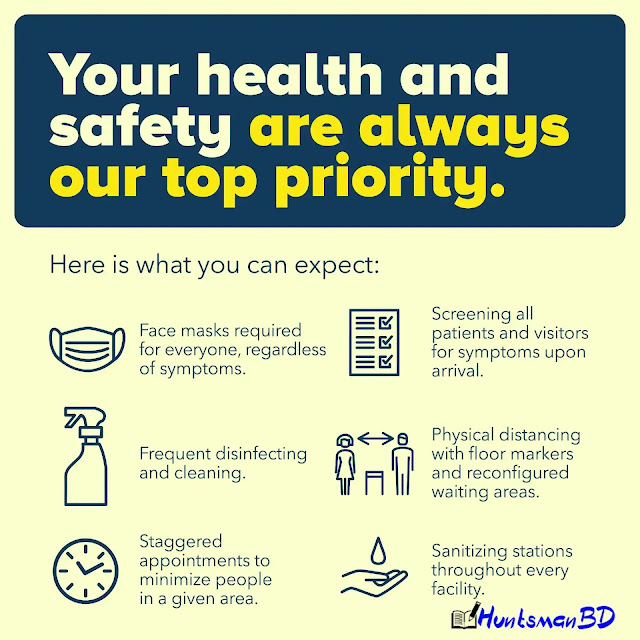What does it mean to be healthy or healthy?
In the Preamble to its Constitution, which came into force in 1948, the World Health Organization (WHO) defines health as “a state of complete physical, mental and social well-being and not merely the absence of disease or infirmity”.
This state and therefore the absence of disease have a direct impact on our quality of life and the years we enjoy it. In fact, medical advances and greater economic development have allowed Spaniards to measure longer. Thus, in recent decades, anticipation has improved a lot throughout the world and also in Spain, which, consistent with data from the WHO publication "World Health Statistics 2014" , is among the highest ten countries in the world with longer life expectancy. Spanish women are, in fact, those that live the longest in the world, only behind the japanese (85.1 years on the average compared to 87.0), while Spanish men have a anticipation of 79, 99 years.
However, at the identical time, this example has given rise to an older population: according to the " Nutritional orientation guide for the elderly " published by Madrid Salud, in Spain 16% of the population is already over 65 years old and This percentage is predicted to reach 20% in 2020.
Are we Spaniards healthy?
According to the February 2015 barometer published by the Center for Sociological Research (CIS) , Spaniards perceive that they're generally in good health: 71.4% say it's "good" or "very good", compared to twenty-eight . 6% who consider it "regular", or "bad or very bad". At the identical time, one in ten Spaniards affirms having suffered difficulties often or fairly often in their work or in carrying out domestic tasks in the last month for health reasons, while 16.3% claim to possess suffered some ailment or pain In this sense, consistent with the results of the latest "National Health Survey", which the INE published in 2013, within the previous five years there was an increase in chronic pathologies such as high blood pressure, high cholesterol, obesity and diabetes.
What diseases affect us the most?
According to data recently published by the National Institute of Statistics (INE) , diseases of the cardiovascular system remained the leading cause of death in 2013 (rate of 252.1 deaths per 100,000 inhabitants), followed by tumors (238 .3) and diseases of the systema respiratorium (91.4). Pathologies of the systema nervosum , including Alzheimer's, were the fourth explanation for death (46.1).
In addition, there are a series of health problems and diseases that are as serious as they're common and that, however, in many cases, are preventable. Among them are the following:
Cardiovascular diseases:
these are pathologies which will affect the heart (heart attack, angina and heart failure) and other organs, like the brain (hemorrhage or cerebral infarction) or the kidney (renal failure). Its appearance is decided by risk factors such as hypercholesterolemia (too high blood cholesterol levels) and hypertension (too high blood pressure).
Diabetes
This is often a chronic condition that occurs when the body loses its ability to produce enough insulin or to use it effectively, resulting in too much sugar in your blood (hyperglycemia). Over time, this glucose finishes up damaging the tissues, a deterioration that within the long term causes alterations, dysfunctions and insufficiencies in organs like the eyes, kidneys, nerves, heart and blood vessels.
Overweight and obesity
Obesity in our country has increased from 7.4% to 17.0% within the last twenty-five years. additionally , 37% of Spanish adults are overweight and three out of ten children and adolescents are overweight or obese. Both the one and therefore the other are risk factors for hypercholesterolemia, hypertension and diabetes.
Chronic respiratory diseases (CKD)
The WHO includes asthma, chronic obstructive pulmonary disease (COPD), respiratory allergies, work-related lung diseases and pulmonary hypertension, among others, during this category.
Stress
Although there are not any epidemiological data, one in three patients who attend the family doctor in Spain presents symptoms derived from stress. consistent with the Spanish Society for the Study of Anxiety and Stress (SEAS), negative, intense stress that persists for an extended period of time increases the probability of developing anxiety problems, chronic fatigue, exhaustion and other problems of health like infectious processes or psychophysiological disorders.
What habits can help us stay healthy?
In order to maintain good health and a quality of life as high as possible over the years, it is necessary to adopt a series of healthy habits on a daily basis that will help us, as much as possible, to enjoy that state of physical, mental and social well-being.
This implies, among other recommendations:
Follow a varied and balanced diet , which provides us with the nutrients and calories that our body needs to stay healthy.
- Hydrate regularly, drinking plenty of fluids.
- Sleep a sufficient number of hours
- Practice physical exercise on a regular basis.
- Moderate alcohol consumption and avoid tobacco .
Despite this, according to the CIS , only 29.3% of the Spanish population practices sport on a daily basis and half of Spaniards acknowledge eating only three meals a day (50.4%), instead of the five recommended by the nutritionists.
In addition, 35.7% of the population say that they sleep less than they used to five years ago, while a third of Spaniards (30%) acknowledge that they take medication without proper medical prescription. On the other hand, one in three Spaniards (28.7%) also smoked cigarettes during the four weeks prior to the survey.
How should our food be?
Some of the most common pathologies today in developed countries such as Spain are directly linked to people's eating and nutritional habits: heart problems, high blood pressure, osteoporosis, diabetes, obesity, digestive disorders... At the same time, the age at which the population begins to suffer from them has decreased. They are also usually chronic problems that, once they manifest, require pharmacological treatment.
Therefore, eating healthy is one of the most effective prevention tools, with a varied and balanced diet. This is the basis, for example, of the Mediterranean diet, capable of regulating blood cholesterol and, being very rich in fiber and antioxidants, of preventing cardiovascular problems. Likewise, it includes all the basic nutrients in adequate and sufficient quantity:
Carbohydrates
They are the main source of energy and are found in pasta, bread, potatoes, cereals, pasta and rice. If they are integral, they are also a source of fiber.
Proteins
Are necessary for the cells and tissues of the body to form. They are present in meat, fish, dairy products, legumes, cereals and nuts, among other foods.
Fats
They provide essential fatty acids and energy, but it is recommended to moderate their consumption, because they can cause an increase in cholesterol or hypertension, among other diseases. They are found in vegetable oils (olive, sunflower, corn), fatty meats, dairy products and some fish, especially blue fish. Also, in sweets and pastries.
Vitamins and minerals
They are necessary for our body to carry out innumerable chemical reactions on a daily basis and can be obtained by following a varied and balanced diet, abundant in fruits and vegetables, of which at least five pieces or servings per day are recommended. In addition, dairy products and oily fish are rich in calcium and red meat, while mollusks, legumes and cereals are rich in iron.
Fiber
The diet should contain at least 25 grams of this nutrient which, among other benefits, helps regulate cholesterol and blood sugar levels. Fiber contains legumes, cereals, nuts and vegetables, fruits and vegetables.
Saturated fats and sugars should be avoided as much as possible , and butter and margarine should be replaced by virgin olive oil, which has heart-healthy properties. Whole grains should also be chosen over refined ones, as they are richer in fiber, vitamins, and minerals.
The way we cook also influences our health: cooking, steaming, grilling or oven are excellent options for healthy cooking; instead, we must avoid fried foods and sauces, and not abuse precooked foods. On the other hand, we should try to cook and eat without salt to protect our hearts.
How much physical exercise should we practise?
In addition to promoting a feeling of well-being, physical exercise helps the heart to work more efficiently, helps regulate cholesterol and insulin sensitivity, improve muscle tone and prevent obesity and overweight, among other benefits.
Therefore, it is necessary to flee from a sedentary lifestyle and walk between half and an hour a day or practice aerobic activities such as dancing, swimming or cycling three times a week, for which it is advisable to reserve moments in our daily or weekly routine.
And, in addition to doing some sport or physical exercise, we must strive to lead an active life on a daily basis. For example, it is advisable to walk instead of driving or take the stairs instead of taking the elevator.
What hygiene standards are recommended in our day to day life?
To keep infections at bay, it is essential to follow a series of hygiene recommendations in our routine, including:
Wash our hands with soap and water frequently , as they are the main vehicle of transmission of microorganisms. To remove them well, we must clean well between the fingers and under the nails. Above all, we must do it on the following occasions:
- After going to the bathroom.
- After sneezing or coughing.
- After touching raw food.
- After cleaning, disinfecting or using chemical products.
- After touching animals or pets.
- After changing the child's diapers.
- Before touching food.
- Shower once a day.
Avoid touching our eyes, nose or mouth so as not to "push" germs into our body.
In order to avoid spreading infections, when coughing or sneezing, it is recommended to cover our nose and mouth with a disposable handkerchief.
Do not share food, glasses, cutlery, handkerchiefs, etc.
Frequently ventilate rooms and other closed places to prevent microbes from concentrating in a room. -When a person is convalescing from an illness or operation, he should also avoid closed and crowded places, especially in winter.
How many hours should we sleep?
During sleep, the body recovers the energy it consumes during the day additionally to performing other crucial functions such as secreting growth hormone.
For this reason, it's essential to sleep at least seven or eight hours each night and, additionally , to adopt regular sleep habits: visiting sleep and getting up every day at the same time, even, if possible, on weekends. the subsequent day we will feel much more energetic and able to perform more in all aspects.
How can we prevent depression and stress?
Despite the importance for quality of lifetime of mental and social well-being referred to by the WHO , consistent with the February 2015 barometer published by the CIS , one in ten Spaniards had felt depressed or unhappy fairly often or often in the previous four weeks.
To avoid these feelings and also the looks of stress, which consistent with the General Council of Psychology of Spain , can accelerate the looks of some pathologies or the progression of a chronic disease, experts recommend trying:
Be positive. Optimism may be a great ally against depression and anxiety. Seeing the glass half full also can be very beneficial when facing difficult circumstances that cause stress. But, although optimistic, we must even be realistic and not demand perfection of ourselves or others, because we'll only feel frustrated.
Strengthen social circles. Being with people , family or friends, helps to relax and reduce stress.
Seek support from others. posing for advice from people you trust, also as expressing your feelings and emotions, both positive and negative, helps you are feeling better and more confident in dealing with problems.
Organize time well. the foremost important activities should be selected and the rest eliminated, in order that there is also time to rest and be with family and friends. Planning fun leisure activities and not taking work home with you is also important.
Chill out. We must take our time to enjoy activities that calm us and are pleasant. for instance , doing breathing exercises, practicing yoga or meditation or just sitting down to read a good book, take a soothing bath, play sports, hear music...
What habits are inadvisable?
Tobacco is one among the most widespread habits among the population and one of the most harmful and unhealthy.
The cigarette can contain 4700 chemical products, 200 poisonous and 43 carcinogenic. This composition causes impairment of both male and feminine fertility, bronchitis and other respiratory diseases. additionally , it increases the danger of heart attack and ages the skin. For of these reasons, we will say that there is no benefit associated with smoking.
In addition, one among the peculiarities of tobacco is that it is not only harmful to the smoker, but also harms the people around him, like young children or the elderly, who, as passive smokers, are suffering from secondhand smoke. cigarettes. Therefore, the sole recommendation that can be given in this regard is to stay away from it.







